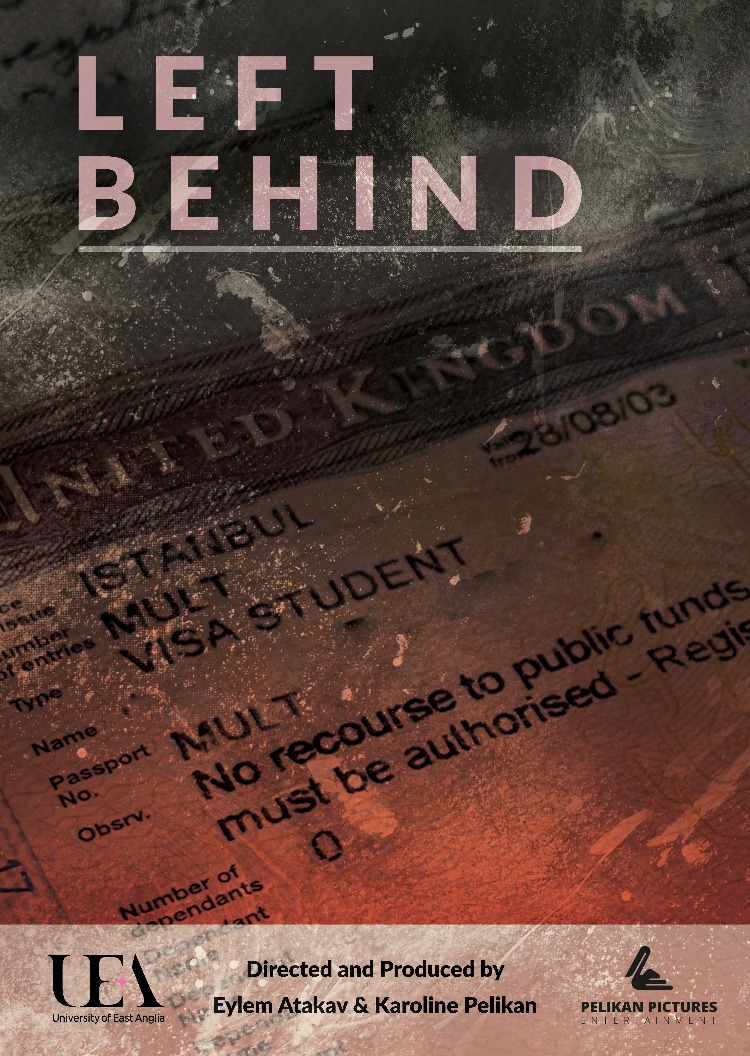)
Left Behind is a short documentary that focuses on migrant survivors of domestic violence in England.
Working with parliamentarians and civil servants, frontline workers, charities and activists, UEA’s Prof Eylem Atakav and filmmaker Karoline Pelikan have created the short documentary highlighting the stories of victims and survivors.
In collaboration with charities, including Southall Black Sisters, Latin American Women’s Rights Service, and Karma Nirvana, as well as the Office of the Domestic Abuse Commissioner for England and Wales, the film advocates a change in Government policy to support the victims of domestic violence where they have No Recourse To Public Funds (NFPF) stamped on their visas.
Last year marked 30 years of campaigning, led by Southall Black Sisters, to reform immigration and no recourse to public funds (NRPF) law for victims of domestic abuse. The year also marked the anniversaries of two major reforms achieved by the campaign:
- Domestic Violence Indefinite Leave to Remain (DVILR) 2002 Rule, which gave victims of domestic abuse on partner/spousal visas the right to indefinite leave to remain in the UK.
- Destitution Domestic Violence Concession (DDVC) in 2012, which enables victims on partner/spousal visas with NRPF the right to receive benefits and social housing for three months while they regularised their stay in the UK under the DVILR.
In April 2021 the UK government introduced the Domestic Abuse Act to ensure that victims of emotional and physical violence are offered vital protection. However, it explicitly denies support to women on non-spousal visas with NRPF and undocumented women, who are not eligible for DVILR and the DDVC. These women continue to face a stark choice between domestic abuse or deportation and destitution. Many are unable to even enter a women’s refuge as they cannot pay their rent or living costs as they are not eligible for housing or other social security benefits. Women and their children are vulnerable to homelessness and exploitation; and can be locked in new dangerous situations or be driven back to abusive relationships.
The UK Government ratified the Istanbul Convention on Preventing and Combating Violence against Women and Domestic Violence in 2022. However, it reserved the right not to comply with Article 59, which requires countries to grant residence to survivors whose immigration status depends on an abusive partner. Victims and survivors of domestic abuse with insecure immigration status face significant barriers to accessing the support and protection that could save their lives. Many victims and survivors are also afraid of reporting to the police or public services due to the fear that their data will be shared with Immigration Enforcement. In turn, perpetrators use their victim’s insecure immigration status to coerce and control them, confident that no one will hold them accountable for their actions.
Left Behind consists of migrant survivors’ stories, the campaigns and the frontline work of national charities, and, the experiences of changemakers at political, legal and policy levels. It is a project that contributes:
to the campaigns that aim to change policies related to migrant victims of domestic abuse and gendered violence and the no recourse to public funds provision;
to knowledge exchange between research and the UK Parliament; and,
to raise public awareness on the topic while highlighting the experiences of migrant women, and the influential works of changemakers including legal professionals, politicians, frontline workers and domestic violence charities.

The film calls the government to action to :
- Extend the Domestic Violence Indefinite Leave to Remain (DVILR) and Destitution Domestic Violence Concession (DDVC) model for those on partner/spousal visas to all migrant victims of abuse regardless of their immigration status.
- Extend the current three-month provision to six months under the DDVC to give victims the ‘breathing space’ to resolve problems by seeking advice and recover from abuse, and to encourage more refuge providers to accept referrals and not turn victims away.
- Introduce a firewall to stop data sharing between statutory agencies and Immigration
Enforcement to enable victims to come forward to report abuse and seek help.
Left Behind is a co-production between the University of East Anglia and Pelikan Pictures. It is co-directed by Eylem Atakav and Karoline Pelikan.
We are calling everyone to take action on this urgent matter.
Please consider sending our template letter to your local MP.
For more information or to get involved visit:
Domestic Abuse Commissioner.uk
Latin American Women's Rights Service
Eylem Atakav is Professor of Film, Gender and Public Engagement in the School of Art, Media and American Studies. She teaches courses on women and world cinema; gender and Middle Eastern media; and documentary. She is the director of Growing Up Married – an internationally acclaimed documentary about forced marriage and child brides in Turkey; and co-director (with Karoline Pelikan) of Lifeline, a short documentary that reveals the reality of working in the frontline of the domestic abuse sector in the UK during the COVID-19 pandemic.
Karoline Pelikan is a documentary filmmaker and cultural manager. Her films, awarded by the Peruvian Ministry of Culture and international cultural organisations, focus on intimate portraits, gender violence and human rights and were screened at major film festivals. Karoline is founder of EmpoderArte, a collective of women that creates safe audio-visual spaces for women and non-binary artists across Peru. She teaches film workshops for women, and creates distribution opportunities for underrepresented communities and filmmakers.
